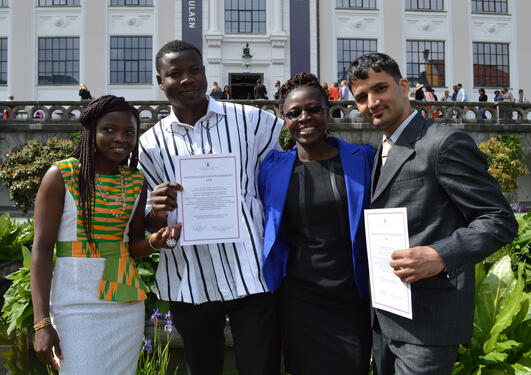Integration of Ghanian immigrants in Bergen
In my master project, I study integration of Ghanaian immigrants in Bergen's labour market and their contribution to development at home.

Main content
In recent times, migration out of Ghana has taken on a new phase to include not only English speaking countries but also the Scandinavian countries like Norway. A considerable number of Ghanaians lives in Bergen, Norway’s second largest city.
Ghanaians may choose Bergen as a destination because of the economic and educational opportunities the region offers. Presently, Bergen has assumed greater importance as the city has become a center of offshore oil and gas industries. This, coupled with the relatively stable nature of the city’s welfare policies makes it an attractive destination for migrants from many developing countries including Ghana (Eriksen, 2013).
Although Ghanaian may be aware of the barriers to Bergen’s labour market before migration, yet they still migrant to Bergen believing in the efficiency of certain strategies to survive and integrate themselves successfully. What may be the reason why migrants from Ghana seem not to be perturbed despite the huge cultural and linguistic distance between Ghana and Norway? What labour market requirements are they confronted with by their quest to seek jobs that they are qualified for?
Among other objectives, this research aims at producing data on how Ghanaians in Bergen find job and the factors that help or prevent them from getting the job they want in Bergen, and which benefits working in Bergen might bring.
Field Work
The data collection for my studies started prior to the actual fieldwork period with participant observations and informal conversations about how Ghanaians settle and find work in Bergen. Based on information received and studies of previous literature on labour market integration of immigrants, I designed a semi-structured questionnaire.
Although the initial main research question focused on only factors that hinder or facilitate successful labour market integration. However with time and issues of funding, the topic changed slightly to include development implications in Ghana. As a result, I interviewed some migrants and followed up on their relatives back home and returned later to continue the main data collection in Bergen.
In this project, the snowball sampling method was first used to identify immigrants of Ghanaian origin whereas purposive sampling was used to further identify various categories of the Ghanaian labour migrants for illustrative studies.
Study Geography in Bergen
Studying Geography at University of Bergen has given me the opportunity to combine academics with personal exploration of the world away from Ghana. I have experience a culturally diverse community of academicians and students which uniquely positioned me to understand wider perspective about social and development issues. With the presences of very learned lecturers and courses such as 'critical perspectives', I have improved immensely my analytical and research capabilities. I have no regret choosing to study geography in Bergen.
Supervisor
